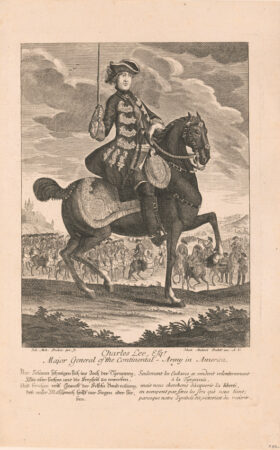On August 12, 1778, just two weeks after the Battle of Monmouth during the Revolutionary War, Major General Charles Lee was convicted at his court-martial of all three charges laid against him for his conduct during the early stages of that encounter: disobeying orders in not attacking the British on the morning of the battle, contrary to “repeated instructions; conducting an “unnecessary, disorderly, and shameful retreat”; and disrespect towards George Washington, the commander-in-chief. Congress would confirm the verdict in December, and Lee was suspended from the army for a year, a sentence so lenient that some interpreted it as a vindication of all but the charge of disrespect.
Sources:
Lender, Mark E., & Stone, Garry W. (2016). Fatal Sunday. University of Oklahoma Press, Norman, Okla., 2016.
Sparks, Jared. (1846). Lives of Charles Lee and Joseph Reed. Little Brown, Boston, Mass., 1846.
Stryker, W. S. (1927), The Battle of Monmouth. Princeton University Press,Princeton, N.J., 1927.
Featured image: Charles Lee Esq’r. – major general of the Continental-Army in America. Probst, Johann Michael, engraver. Created between 1776 and 1790. Library of Congress, public domain.


Leave a Reply